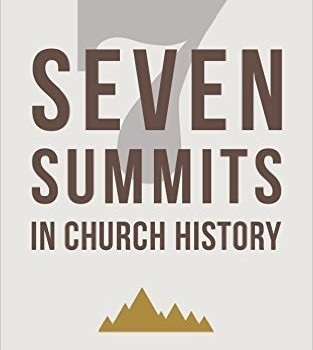Review: Seven Summits in Church History by Jason Duesing
As I’ve previously written, biographies are a constant part of my reading diet. I find biographies, especially of Christian leaders, uniquely encouraging and well worth prioritizing.
A great biography has at least four ingredients. First, it features a celebrated person. Few people want to spend time reading about an undistinguished life. There just are too many extraordinary lives to read about to spend time on a person who played second fiddle.
Second, a biography most worth reading also features a colorful personality. One can live a consequential yet not colorful life, but a great story combines both. For example, both Teddy and Franklin Roosevelt lived massively consequential lives. But Teddy, though he was less consequential than Franklin, is a more fascinating read because he was so colorful and so adventurous.
Third, the best biographies tell the story of a person in consequential times. Their impact sends massive ripples because they acted on a massive stage. It was always fun to watch Michael Jordan score 50 points, but it was truly epic when he did it in a clutch playoff game. Great biographies tell the story of a great person, acting on a great stage.
Lastly, a great biography is clearly written. Great biographers are like maestros at the symphony, they assemble and coordinate the story, but let the person and his times get the attention, not the writer.
These four reasons are why I so enjoyed reading Jason Duesing’s new book, Seven Summits in Church History. Duesing—who serves as provost and associate professor of historical theology here at Midwestern Seminary—knows how to set the stage as a biographer and let the story tell itself.
Seven Summits is a compilation of brief, introductory biographies of seven giants of the Christian faith: Augustine, Martin Luther, John Calvin, Balthasar Hubmaier, Jonathan Edwards, William Carey, and Carl F.H. Henry.
Duesing’s biographies are more devotional and pastoral than academic. They are not thesis driven but are instead intended for laymen as much as for pastors or seminarians. He is sympathetic with Thomas Carlyle’s “Great Man” Theory of history, but seeks a more moderated, James Davison Hunter-like approach, appreciating the social, cultural, and ecclesiastical forces that shaped these men and their times.[1]
For those who study church history, Duesing suggests humility is the chief virtue. It both enables a faithful study of church history and is engendered by those who rightly study church history.[2] Indeed, as Duesing reminds us, we stand on the shoulders of giants.
While Duesing’s treatment of each one of the seven figures is encouraging, for the sake of this brief review, I want to draw attention to just one—Martin Luther. Herein we see the four characteristics of a great biography at work: Luther was a consequential man, with a colorful personality, acting on one of the most eventful stages in human history, with his story set forth in a clear, non-distracting way.
Here is a sampling of Duesing’s fine work:
In 1521, Luther received a summons by the Emperor to the town of Worms. There Luther refused to recant before the State and famously responded, “My conscience is captive to the Word of God….Here I stand, I cannot do otherwise.” Luther was ousted by the church, banned by the state, and now considered an outlaw. Eventually resettling in Wittenberg, Luther would provide one of his greatest gifts to Germany with the German translation of the New Testament in 1522 and eventually the entire Bible by 1534.[3]
Duesing goes on:
While the work of God in his life transformed the world and lives of many, Luther retained a sinful nature and still sinned. Yet, all the while Luther referred to himself as Eleutherius, the free man. Set free by the justifying imputed righteousness of the Son of God, Eleutherius was free indeed.[4]
Conclusion
Duesing is a great colleague and even greater friend to me. I am daily encouraged and sharpened by this thinking, much like I was by reading Seven Summits. As you read Seven Summits, you’ll be sharpened and encouraged as well, and you’ll be reminded you stand on the shoulders of giants.
[1] 17.
[2] 21.
[3] 57.
[4] 59.
topicsBook Reviews, Church History, Jason Duesing

Comments are closed.